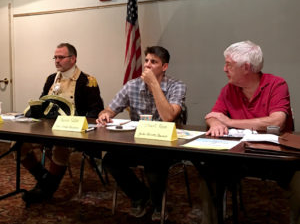
On Wednesday September 19, 2018, the York River Group of the Sierra Club held a series of solar-related talks at Sandy Bottom Nature Park. Three speakers entertained the group.
Erik Curren, author of the new book The Solar Patriot, believes that ordinary citizens have the right to produce and use their own solar power, which will help create a clean energy future. Erik is a councilman in Staunton, VA. Dressed in American revolutionary garb, he stressed that solar power is a fundamental right, and in the public interest. But – like King George III from the late 1700s – our elected officials are passing laws that only support corporate monopolies. This type of corporate welfare is counter to the public interest, and ordinary citizens need to fight against it. “Victory or Death” was his rallying cry. Erik feels that because it benefits all people, solar energy is something that transcends political affiliations.
Aaron Sutch, Virginia Program Director of Solar United Neighbors, works to empower people to join the solar community for change. He works in policy and advocacy. He explained how “distributed” solar power means rooftop solar installations on millions of individual homes, as opposed to large centralized solar farms run by public utilities. Distributed solar is very resilient when coupled with battery storage. And contrary to myth, solar installations on individual homes has proven to be affordable and long lasting. With distributed solar, the control and profits go back into the community, rather than lining the pockets of corporations. Aaron emphasized that our solar rights in Virginia are mostly controlled by the Virginia state legislature, and not by the federal government. It is our state legislature where corporations like Dominion Energy pour millions of dollars to influence votes.
Stuart Rose is architect of Garden Atriums, an elegant group of fully sustainable solar homes in Poquoson, VA. The goal is to make these homes “net zero” in terms of energy use. He includes passive solar (where the building is the collector), closed-loop geothermal, rainwater collection, and many other eco-friendly methods. He has written “The Challenge of Change,” available for free from his website gardenatriums.com.
Like the three speakers, the Sierra Club supports the move toward more solar energy, particularly distributed solar. It is good for individuals; it is good for communities; it is good for the planet. It is difficult to battle corporations and moneyed interest groups, but consumers have the right to have more control over their own energy. Clean energy is possible. And it is going to happen; it’s just a question of when. Like the American patriots of the Revolutionary war, individuals need to step up and fight for their “solar” rights.
Chris Rumsey, September 23, 2018